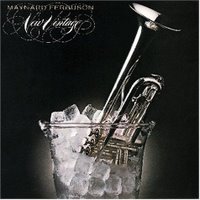
In 1996, the Journal of English Linguistics published an article (Soda or Pop?, #24, 1996) and the above map by Luanne von Schneidemesser, PhD in German linguistics and philology from the University of Wisconsin-Madison and senior editor of the Dictionary of American Regional English. The article shows the regional variation in American English of the names given to that type of drink as of the mid 90s.
The reason I find this of interest is that this topic was the subject of much debate when I was a teenager. :) In the fall of 1977, the drum corps I was marching with at the time (the Mark Twain Cadets) merged with another corps sixty miles to our east (the Grenadiers of Broome County, NY) to form a new corps (the Empire State Express) that I marched with in the summer of '78.
Being typical teenagers, we all loved our soft drinks, except that we discovered there was a significant difference between the two sides of the corps: all the ex-Cadets called pop "pop" (as I still do) and all the ex-Grenadiers called pop "soda." And that was just something we had the most difficult time getting over. What do you call a soft drink? Is it pop or soda (or some other word)? And what I find extremely interesting about this map is that it shows exactly why the two corps could not agree on such a trivial matter. The county I grew up in, where the Cadets were located, is the furthest southeast in New York (along the Pennsylvania border) of the blue counties where people say "pop" (in the 50-80% range). And the Grenadiers came from two counties over to the east along the Pennsy border, which is an 80-100% "soda" county. And I never knew until now that my county was literally on the border of that great northern swath of "pop" drinkers that extends all the way from central New York to the Pacific, and from the Canadian border down south to roughly the latitude of 37° North (i.e., the southern border of the states of Virginia, Kentucky, Kansas, Colorado and Utah).
So for the entire summer, whenever we'd travel to some city or town for a parade or competition, there was this running joke in the corps: "Hey, let's see what the local people call it, soda or pop." And as you can see, whenever we were in the eastern half of New York or Pennsylvania (or, later that summer, Massachusetts), they called it "soda." And when we traveled to the western halves of New York and Pennsylvania (and Ohio), people called it "pop." (BTW, we corps members were also warned prior to our trip to Lynn, Massachusetts that the people around Boston called pop "tonic," as is mentioned in the last bullet point below.)
coke: this generic term for soft drinks predominates throughout the South, New Mexico, central Indiana and in a few other single counties in Nevada, Utah and Wyoming. ‘Coke’ obviously derives from Coca-Cola, the brand-name of the soft drink originally manufactured in Atlanta (which explains its use as a generic term for all soft drinks in the South). pop: dominates the Northwest, Great Plains and Midwest. The world ‘pop’ was introduced by Robert Southey, the British Poet Laureate (1774-1843), to whom we also owe the word ‘autobiography’, among others. In 1812, he wrote: A new manufactory of a nectar, between soda-water and ginger-beer, and called pop, because ‘pop goes the cork’ when it is drawn. Even though it was introduced by a Poet Laureate, the term ‘pop’ is considered unsophisticated by some, because it is onomatopaeic. soda: prevalent in the Northeast, greater Miami, the area in Missouri and Illinois surrounding St Louis and parts of northern California. ‘Soda’ derives from ‘soda-water’ (also called club soda, carbonated or sparkling water or seltzer). It’s produced by dissolving carbon dioxide gas in plain water, a procedure developed by Joseph Priestly in the latter half of the 18th century. The fizziness of soda-water caused the term ‘soda’ to be associated with later, similarly carbonated soft drinks. Other, lesser-used terms include ‘dope’ in the Carolinas and ‘tonic’ in and around Boston, both fading in popularity. Other generic terms for soft drinks outside the US include ‘pop’ (Canada), ‘mineral’ (Ireland), ‘soft drink’ (New Zealand and Australia). The term ‘soft drink’, finally, arose to contrast said beverages with hard (i.e. alcoholic) drinks.

